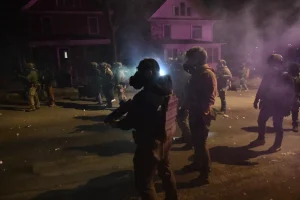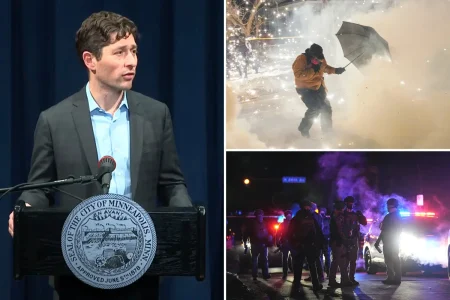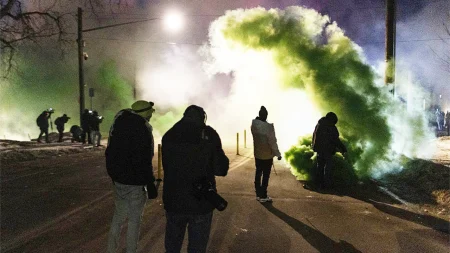The Haunting Memory: One Man’s Literary Journey Through Grief, History, and Franco’s Spain
Personal Tragedy Transformed into Literary Reflection After Seven Decades of Silence
In the quiet corners of memory, some wounds remain raw despite the passage of time. Such is the case for renowned author Manuel Sánchez, whose recently published memoir “Shadows of Silence” has captured the attention of literary critics and history enthusiasts alike. Nearly seven decades after a devastating family tragedy, Sánchez has finally broken his silence about the accident that claimed his younger brother’s life in 1954 – a pivotal moment that shaped not only his personal journey but also his complex perspective on Spain’s turbulent political landscape under General Francisco Franco’s dictatorship.
The 87-year-old writer, speaking from his sun-drenched apartment in Madrid, reveals that publishing this deeply personal narrative required confronting ghosts he had long kept at bay. “Some memories carve themselves so deeply into your being that they become part of your cellular structure,” Sánchez explains, his weathered hands trembling slightly as he describes the fateful summer afternoon when his 12-year-old brother, Antonio, was struck by a military vehicle in their small village outside Salamanca. “I was 18, preparing to begin university studies. One moment changed everything – my family’s trajectory, my relationship with my country, my understanding of mortality.” This tragic incident serves as the emotional anchor of his memoir, which weaves together personal reflection with broader observations about life under Franco’s authoritarian rule.
Controversial Perspectives on Spain’s Former Dictator Challenge Modern Sensibilities
Perhaps most controversial among critics is Sánchez’s nuanced portrayal of General Francisco Franco, a figure typically vilified in contemporary historical analysis. While acknowledging the oppressive nature of the regime, Sánchez’s memoir presents a more complicated relationship with the former dictator than many readers might expect. “I understand how my perspective might appear problematic to younger generations,” Sánchez acknowledges with characteristic forthrightness. “But historical truth demands complexity. The Spain I inhabited as a young man cannot be reduced to simple moral categorizations.” The author describes how the military officer responsible for his brother’s death was swiftly disciplined under Franco’s direct orders, an act that profoundly influenced his family’s view of the leadership during a period of intense national suffering.
This respectful, sometimes appreciative, portrayal of Franco has generated significant debate among historians, political commentators, and younger Spanish citizens still grappling with their nation’s authoritarian past. Dr. Elena Morales, professor of Modern Spanish History at the University of Barcelona, notes that Sánchez’s memoir represents an increasingly rare first-person perspective from those who lived through Spain’s most controversial era. “What makes Sánchez’s work significant is not whether we agree with his assessment of Franco, but that it captures the genuine complexity of how ordinary Spaniards experienced and rationalized their relationship with authority during this period,” Morales explains. “These perspectives, however uncomfortable, are essential pieces of our complete historical record.”
Literary Excellence Elevates Personal Narrative Beyond Simple Memoir
Beyond its historical and political dimensions, “Shadows of Silence” has garnered substantial praise for its extraordinary literary merit. Critics have likened Sánchez’s prose to that of Joan Didion and Gabriel García Márquez – authors who similarly transformed personal grief into transcendent reflection. The memoir unfolds with remarkable restraint, avoiding melodrama while still conveying profound emotional truth. Sánchez reconstructs the accident scene with haunting precision: the quality of Mediterranean light on whitewashed buildings, the sound of his mother’s hands working bread dough when news arrived, the smell of motor oil that still triggers his most painful memories. These sensory details anchor what eventually expands into a meditation on mortality, national identity, and the shifting nature of truth across decades.
“What distinguishes this work from conventional memoir is its resistance to easy resolution,” notes literary critic Isabel Fernández in her review for El País. “Sánchez doesn’t offer readers the comfort of lessons learned or wounds healed. Instead, he presents grief as a companion that evolves but never departs.” This unflinching honesty extends to his political reflections as well. Rather than positioning himself as either victim or apologist of the Franco era, Sánchez describes a citizen’s complicated negotiation with power – the daily compromises, small resistances, and moral ambiguities that characterized life under authoritarian rule. His account of visiting Franco’s office as part of a university delegation in 1956, where the dictator personally expressed condolences for his family’s loss, showcases the author’s remarkable ability to hold contradictory truths simultaneously – to acknowledge both the man’s personal courtesies and his regime’s broader repression.
Historical Context Provides Crucial Framework for Understanding Controversial Perspectives
To fully appreciate Sánchez’s perspective requires understanding the historical context of post-Civil War Spain. Following the bloody conflict that divided the nation between 1936 and 1939, Spain emerged traumatized, impoverished, and isolated from the international community. For many ordinary citizens, particularly in rural areas where Sánchez’s family lived, basic survival often superseded political ideology. “People today forget what daily life was like then,” Sánchez observes. “We had experienced the chaos of war, the hunger of the 1940s. When stability arrived, even under authoritarian conditions, many experienced it as relief rather than oppression.” This context informs his complicated respect for Franco, whom he credits with maintaining Spain’s neutrality during World War II and later establishing economic reforms that gradually improved living conditions.
Historians note that such perspectives remain valuable even when they challenge contemporary political sensibilities. “Democratic Spain has rightfully condemned Franco’s repressive tactics and human rights abuses,” explains Dr. Carlos Mendoza, curator of Madrid’s Contemporary History Museum. “Yet historical understanding demands we acknowledge that his regime was experienced differently across regions, social classes, and political affiliations. Sánchez’s account represents those Spaniards – particularly rural, traditional families – who found certain aspects of the regime aligned with their values and experiences.” The memoir arrives at a particularly sensitive moment in Spain’s ongoing struggle to address its Francoist past, with recent legislation aimed at removing remaining symbols of the dictatorship and providing reparations to victims of political persecution. Sánchez’s work complicates these efforts by reminding readers that lived experience often defies political categorization.
Literary Journey Concludes with Reconciliation of Personal and National Trauma
As “Shadows of Silence” reaches its conclusion, Sánchez achieves something remarkable – a reconciliation not only with his personal loss but with Spain’s complicated history. In the memoir’s final chapters, he describes returning to the accident site in 2020, accompanied by his grandchildren who had only known this family tragedy as distant lore. “Standing there, I realized that grief had transformed from a wound into a bridge – connecting me not just to Antonio but to generations that would never know him,” he writes. This moment of personal reflection expands into a meditation on how nations similarly process collective trauma, gradually integrating painful chapters into a more complete understanding of national identity.
The memoir concludes with Sánchez’s reflections on modern Spain – its democratic transformation, economic development, and evolving relationship with its complicated past. “A nation, like a person, must learn to carry its contradictions,” he writes. “We cannot erase Franco from our history any more than I can erase the accident from my life. Both must be examined honestly, with all their complexity and contradiction.” This wisdom, earned through decades of reflection, offers readers something more valuable than political judgment or historical revision – it provides a template for how individuals and societies might process trauma without being defined by it. As “Shadows of Silence” takes its place in Spain’s contemporary literary landscape, it stands as testimony to the power of personal narrative to illuminate larger historical truths, reminding us that even the most painful memories, when finally expressed, can become sources of profound insight.







